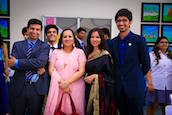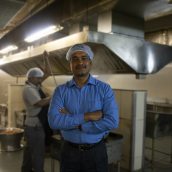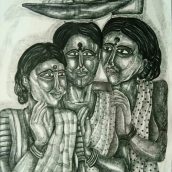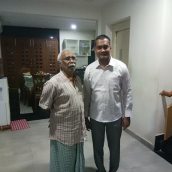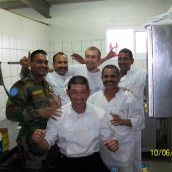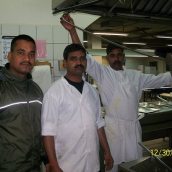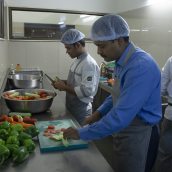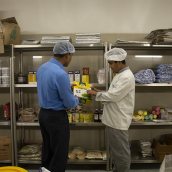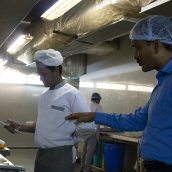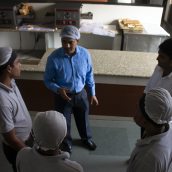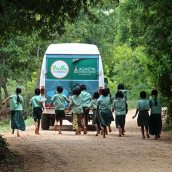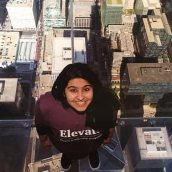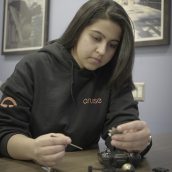At the Aga Khan Academy Mombasa, Ham Serunjogi – CEO and co-founder of African fintech giant Chipper Cash – realised the importance of staying connected to something larger than himself. The Forbes 30 Under 30 honouree is now serving as an advisor to the US President on African diaspora engagement.
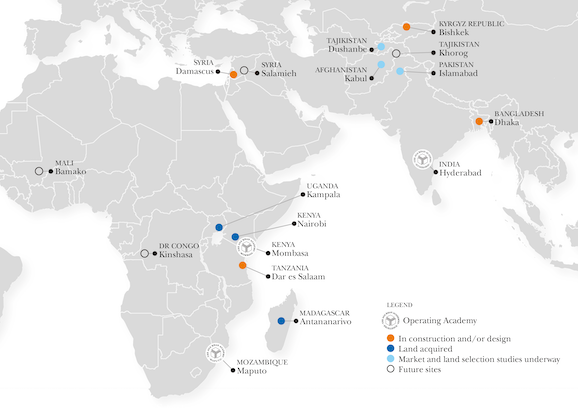
The Academies Network
The Aga Khan Academy Dhaka is the fourth in a network of Aga Khan Academies being established in countries across Africa, South and Central Asia, and the Middle East. The first Academy opened in Mombasa, Kenya in 2003, the second in Hyderabad, India in 2011 and the third in Maputo, Mozambique in 2013.
The aim of the Academies is to develop future leaders with the skills and knowledge to support positive development in their societies. We achieve this by recruiting exceptional young people from all backgrounds and providing them with the highest international standard of education.
Admission is competitive and based on student merit, regardless of a family’s ability to pay. Each Academy endeavours to meet the demonstrated financial need of each admitted student.
When complete, the network of Academies will form a global learning community of approximately 18 schools in 14 countries (map). They will eventually serve approximately 14,000 girls and boys of exceptional calibre, graduating 1,500 students annually.
For more information, visit our Academies network home page.
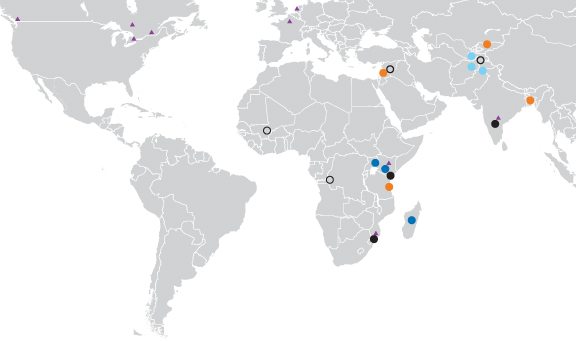
The Academies Network
The Aga Khan Academy Maputo is the third in a planned network of Aga Khan Academies being established in countries across Africa, South and Central Asia, Europe and the Middle East.
The aim of the Academies is to develop future leaders with the skills and knowledge to support positive development in their societies. We achieve this by recruiting exceptional young people from all backgrounds and providing them with the highest international standard of education.
Admission is means-blind and based on merit to ensure access for eligible students regardless of financial circumstances.
"...the Academies will be serious, focused, rigorous environments – but at the same time they will be spacious and joyous places. They will operate on the cutting edge of knowledge and pedagogy, but they will be rooted in history and steeped in tradition."
When complete, the network of Academies will form a global learning community of approximately 18 schools in 14 countries (map).
They will eventually serve approximately 14,000 girls and boys of exceptional calibre, graduating 1,500 students annually.
For more information, visit our Academies network home page.
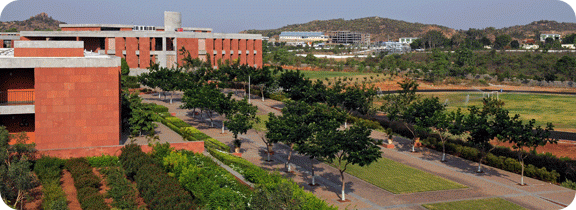
About the Academy
The Aga Khan Academy Hyderabad is an International Baccalaureate (IB) World School and is the second in the network of Aga Khan Academies established by His Highness the Aga Khan.
The Academy features state-of-the-art facilities, a multicultural student body, and an experienced team of educators and staff. We provide students with education of the highest standard in order to prepare them for lives characterised by leadership and service.
Admission to the Academy is competitive and based on student merit, regardless of a family’s ability to pay. We consider all eligible students regardless of socio-economic status.
Mission statement
The following is the mission statement of the Aga Khan Academy Hyderabad:
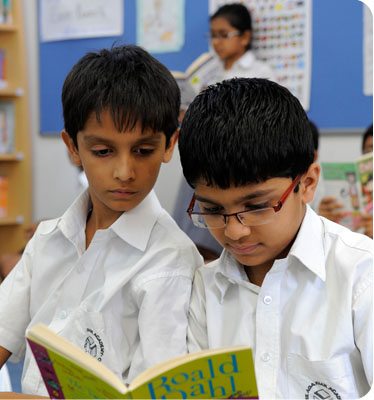 "The Academy will identify and nurture exceptional young people from any background with the potential to become effective, ethical leaders. It will be a joyful community of lifelong, fearless learners who are culturally-rooted and internationally-minded. Academy graduates will be reflective, compassionate, adventurous and creative citizens empowered as stewards to make a positive contribution in a changing world."
"The Academy will identify and nurture exceptional young people from any background with the potential to become effective, ethical leaders. It will be a joyful community of lifelong, fearless learners who are culturally-rooted and internationally-minded. Academy graduates will be reflective, compassionate, adventurous and creative citizens empowered as stewards to make a positive contribution in a changing world."
A culture of excellence
As with all the Aga Khan Academies, we are committed to excellence in all aspects of education. This commitment includes the academic curriculum as well as the campus where students live and learn.
Our campus is architect designed and purpose built. It features state-of-the-art classrooms and resource areas, and extensive sports facilities. These outstanding facilities provide an inspiring environment for both students and staff.
At the Academy, we strive to create a balance between academic demands, sports, cultural activities, and community life. We challenge our students to be intellectually inquisitive and socially conscious. We also encourage them to respect and appreciate other people’s cultures, social structures, values and beliefs.
A rigorous academic programme
Our academic programme has been developed through the implementation of the widely-recognised International Baccalaureate. The programme is designed to challenge students of all backgrounds.
Our aims for our students include:
- promoting academic excellence
- enhancing analytical and study skills
- building leadership skills
- fostering an ethical outlook and sense of civic responsibility
- developing an understanding of global issues
- encouraging creativity.
Experienced local and international teachers lead our programmes. Faculty members are up-to-date with the best educational practices. They are committed both to their students’ learning and to their own continuing professional development.
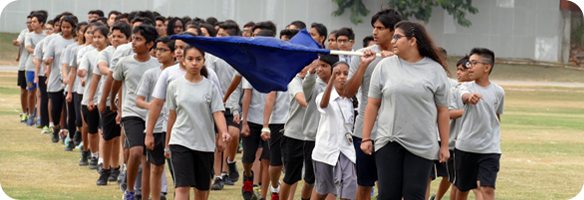
Diploma Programme
The Aga Khan Academy Hyderabad has received authorisation as an International Baccalaureate (IB) World School offering the IB Diploma Programme (DP). The programme is offered to students (aged 16–19) in the final two years of school.
The Diploma Programme is a demanding, pre-university-level course of studies. It is internationally recognised by over 2,000 universities worldwide.
The DP has a reputation for rigorous assessment of student achievement. Each student’s performance and levels of knowledge are examined internally by teachers according to set criteria. They are also assessed externally by independent examiners according to global standards applied to all IB schools.
Our students study all the subjects covered in a traditional, broad curriculum, including languages, social sciences, experimental sciences, mathematics and the arts. The DP also takes the curriculum a step further through three unique programmes:
- theory of knowledge
- creativity, activity, service
- extended essay.
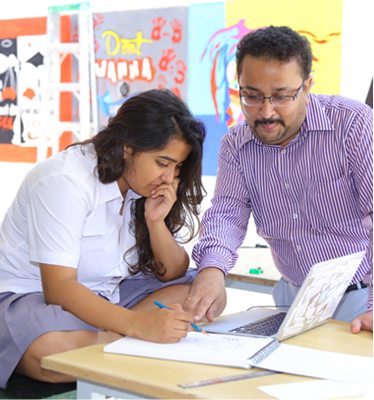 Theory of knowledge
Theory of knowledge
Theory of knowledge (TOK) is an interdisciplinary requirement unique to the International Baccalaureate Diploma Programme. It encourages students to reflect on the knowledge they gain both inside and outside the classroom.
One hundred hours of classroom time are dedicated to the TOK programme. We challenge our students to question the nature of knowledge across disciplines, to recognise biases and to analyse evidence using rational thought and argument. By making our students consider and appreciate different perspectives, TOK contributes towards a pluralistic outlook.
Creativity, activity, service
Creativity, activity, service (CAS) is an important component of the IB curriculum and is required for every DP student at the Academy. Our students participate actively in a variety of creative endeavours, physical activities and community service projects. They develop self-confidence, teamwork and leadership skills, and a sense of civil responsibility.
Students take part in sustainable projects that have real and lasting effects on the greater Hyderabad community. They develop strength of character and an understanding of their ability to bring about change.
The CAS programme is valued for its power to transform the lives not only of students but also the people they work with. It serves as a platform for interpersonal exchange, personal growth and greater understanding of the issues we face as a global community.
Extended essay
The extended essay requires students to pick a subject of their choice and research and develop it into a 4,000-word essay. Students may choose to investigate a subject from one of their higher-level courses more deeply. Or they can broaden their academic experience by researching a subject in a field they are not currently studying.
Through the extended essay, we introduce students to the kind of independent research and writing skills expected at the university level.
For further information on the IB Diploma Programme at the Academy, please see the admission requirements or contact us.
Tanish Panjwani (Class of 2019) - advocating scientific solutions for a better world
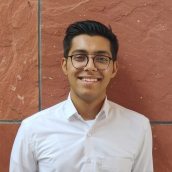 Tanish Panjwani is an alumnus of the Aga Khan Academy Hyderabad's Class of 2019 and is determined to follow a path he will carve independently, “off the beaten track.” He attributes this fierce individuality to the opportunities he has been presented with in school.
Tanish Panjwani is an alumnus of the Aga Khan Academy Hyderabad's Class of 2019 and is determined to follow a path he will carve independently, “off the beaten track.” He attributes this fierce individuality to the opportunities he has been presented with in school.
"The Academy has pushed me to boundaries and spaces which I never imagined being in,” he expressed. “It has taught me many important life lessons which I wish to take with me as I move towards university. One of these is to always try something new. It gave me so many opportunities to explore my passions for which I am eternally thankful."
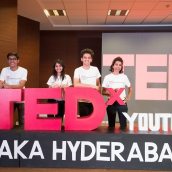 Tanish was one of the three student organisers of Academy in Hyderabad’s pioneering TEDx conference, which took place in May 2018.
Tanish was one of the three student organisers of Academy in Hyderabad’s pioneering TEDx conference, which took place in May 2018.
“TEDxYouth@AKAHyderabad began as a revolution of ideas that inspired me to dream big and accomplish more. I wanted the students in the Academy to dream and imagine with the same ferocity, and come up with ideas that not only solve global problems but also inspire. This was my motivation behind organising such a conference here.”
Additionally, he held key leadership positions in the Academy’s Model UN conferences, played in the Senior School football team and was a chief editor of the student newsletter.
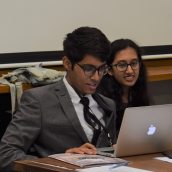 However Tanish’s passion lies in the realm of physics, believing in the power of scientific solutions to address current global issues.
However Tanish’s passion lies in the realm of physics, believing in the power of scientific solutions to address current global issues.
“A better understanding of our surroundings helps us gain a better understanding of ourselves," he said. "The biggest breakthroughs have come from principles based on physics – smartphones and normal appliances are built on the foundations of quantum tunneling. Not understanding physics hinders us from truly understanding the world around us.”
For his Grade 10 personal project, Tanish focused on the importance of a future free of climate change and pollution. He used an old television to make a cathode ray tube (CRT) that disintegrated plastic and created something new in its place. He draws inspiration from his physics teacher Sudipta Roy.
“He teaches with such great passion and his zestful energy lights up my mood inspiring me to study even the most boring (and difficult) topics.”
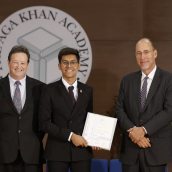 Tanish was accepted into University College London and the University of Glasgow to study pure physics, and intends to make connections in the fields that interest him. He wants to get involved in actively educating people about the possibilities of approaching everyday problems through the lens of science, by utilising concepts learnt within classrooms to bring small changes in their immediate environments, leading to big changes in a bigger context.
Tanish was accepted into University College London and the University of Glasgow to study pure physics, and intends to make connections in the fields that interest him. He wants to get involved in actively educating people about the possibilities of approaching everyday problems through the lens of science, by utilising concepts learnt within classrooms to bring small changes in their immediate environments, leading to big changes in a bigger context.
Contributed by Saheb Lakhani (Class of 2014).
Aashish Dhammani (Class of 2015): Student into teacher
Read below about alumnus Aashish Dhammani's unique experience as an intern at the Aga Khan Academy Hyderabad.
As an intern at the Aga Khan Academy Hyderabad, you are immersed in the everyday life of teaching and learning amidst some extraordinary intellectuals. As an Academy graduate, I have valued diversity in thoughts, lifestyles and priorities. In the last three months and 14 days, that was put to the test. Every day has been a learning experience; be it with peers or among guests with immense wisdom, my storehouse is now filled with a plethora of knowledge.
Interning under the Dean of Students Aaron Jacob, my internship focused on academic support for the International Baccalaureate (IB) Diploma Programme students in history and the theory of knowledge. Additionally, I was a dorm parent trying to balance a variety of academic and personal issues in student life. In the process, I have developed skills in time management, communicating in a working environment and organisation and resilience under pressure. I was also involved in the facilitation of the Academy's yearbook for 2016, interaction with visitors, assisting in the making of the first IB Middle Years Programme film and various Senior School events.
In my time here, I have grown to value the time, energy and knowledge that goes into the profession of teaching, which unfortunately is not widely respected across our Indian subcontinent. I also realised that as a teacher, you work equally as hard as any student in your class. In the future, my goal will also be to change the stereotypical image of a profession which is as challenging, enriching and rejuvenating as any other valuable profession. Teaching is reliving every day and growing individually.
The Academy is an environment that challenges and nurtures leaders who are fearless, courageous and stewards. I have always envisioned growing up to be one myself. After this internship, I am confident my dream is not too far removed. I will continue to motivate myself to grow, beat the odds, acknowledge diversity and tap into the unfathomable.
I am ready to take on another journey from oblivion to self-discovery!
Dhan Prasad - the Academy's own renaissance man
Dhan Prasad was born in Hyderabad after his parents relocated here from Nepal, and grew up in Red Hills. He joined the Institute of Hotel Management and Catering Technology, completing their Food Production & Patisserie course in the year 1993. In the following years, Dhan Prasad trained and worked at two of the premiere hotels in India, the ITC Grand Chola in Chennai and Oberoi Krishna in Hyderabad (renamed Taj Krishna). It was during this stint in Hyderabad that Dhan Prasad decided to pursue his passion for the arts. “You can call it my first love,” he says.
As a school boy, Dhan Prasad often visited the Jawahar Bal Bhavan in Nampally. The Bal Bhavan, with its high ceilings, yellow walls and large play area was created to be a place where children could hone their talents in the arts, learning music, dance, and, of course, drawing and painting. Here, he trained under artist and National Film Award winner, Thota Vaikuntam, whom he describes as his role model, guru and inspiration. “He used to encourage me by giving me big drawing charts and colours.” Dhan Prasad re-entered university in 1995, this time as a fine arts student at the Jawaharlal Nehru Architecture and Fine Arts University. His art, mainly sketches and acrylic, portray scenes of men and women, often at work, and always in conversation. The paintings are on large canvases, and though they have some of the stylistic attributes of Madhubani art, they are strikingly unique. The Bal Bhavan he went to is still active today and caters to around 3000 children in spite of being under-funded, and sharing its space with a local fire department.
“It was very tough to manage my work and my painting,” he says. Dhan Prasad was juggling university work and his job at the Krishna simultaneously at this time. As the pressure mounted, he was informed that he had been chosen to be Junior Commissioned Officer (JCO) of catering in the Indian Army, a proposition that comes from the desk of the President of India. Dhan Prasad describes joining the army as a bold decision. He remembers thinking, “I cannot ignore this opportunity to serve my country.” So he, in his words, left his white chef’s robes and donned the olive green of the Indian army.
Glad to have the opportunity to serve his country with his culinary abilities, he worked in the army for 19 years, serving in its storeyed institutions across the country and even abroad. Dhan Prasad was among the forces sent from India to be a part of the UN’s mission to maintain ceasefire between Syria and Israel. “My most memorable days were as kitchen manager of an international kitchen at UNDOF (United Nations Disengagement Observer Force), Israel,” he shares. “My most challenging work was at IMA (Indian Military Academy), Dehradun and OTA (Officers Training Academy), Chennai.” In these kitchens, Dhan Prasad organised meals and hospitality services for 2000-2500 people every day. Standing in charge of these large operations gave Dhan Prasad an understanding of the workplace, responsibilities and leadership, which make him revered by those who work under and alongside him.
“Being an army man he brings discipline to our catering,” says Head of Operations at AKA Hyderabad, David Roy. “He’s always on the dot.” Dhan Prasad and David work very closely, and often under high pressure. “In three years, we have never missed catering at a single event, and this is because of our excellent kitchen, its staff, and of course, Dhan Prasad.” It is a great compliment to him that in spite of the demanding nature of their job, Dhan Prasad has created an atmosphere of conviviality in the kitchens and among his support staff. “He understands his job, his responsibilities,” says David. “But the problem with him is that he doesn’t say no to anyone!”
The demands of the Academy’s kitchen are different from those of a military kitchen, and Dhan Prasad relishes the challenges that come with this job. “The diversity [in the students, faculty] gives me an opportunity to challenge myself and be innovative and creative in our day to day catering services,” he says. Dhan Prasad also looks forward to the holy month of Ramzan and being able provide for fasting students at the early hours of dawn. “The Global Encounters holiday camps offer other opportunities to test our calibre,” he adds.
Working at a school, Dhan Prasad believes learning about the mammoth effort that goes into their meals could be beneficial to students’ education. “Students need to have responsibility toward their food." He wants students to be informed about the processes of the food & beverage industry and also about etiquette. “Our students are future ladies and gentlemen who will go out internationally and later become responsible citizens of the nation. Table manners count for a lot when it comes to the personality of an individual.”
At 17, Dhan Prasad knew he wanted to be in hospitality. Today, he is a chef, an artist, and a retired Subedar Major. The praise heaped on him is the kind that Swiss watchmakers pine for. He is efficient, dependable and yet creative. “Art is long and life is short,” he muses. “Cooking is an art and science, it never ends and we can’t master it. The only thing we can do is try, practice and keep doing good work.”
Written by Ajay Sundaram
Spotlights on Alumni
Below are spotlights on some of the Aga Khan Academies alumni:

Although it has been a few years since he graduated from the Aga Khan Academy Mombasa, Alqaim Lalani, Class of 2019, says his years at the Academy had a major bearing on his academic career and strongly influenced his outlook on life. Now, as a graduate of Columbia University in New York, Alqaim is giving back to the Aga Khan Academies community that he says shaped his life and gave him so much.
Jemin Patel’s journey to where he is now is the result of hard work and passion, values he picked up during his time at the Aga Khan Academy Hyderabad. Now, he's working at one of Canada's top accounting and consulting firms, still standing by the notion, "hard work always wins."

Muskaan Bhaidani is an alumna of the Aga Khan Academy Mombasa who was in the Class of 2020. Graduating with an impressive International Baccalaureate (IB) Diploma Programme (DP) score of 44 out of 45, Muskaan is now attending McGill University in Montreal, Canada.

Anahita Aman, a graduate of the batch of 2020 was here at the academy for 8 years. Currently pursuing History at University College London, she hopes to build a career in International Development.
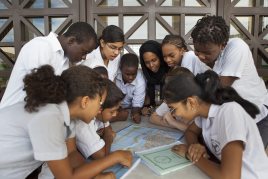
Congratulations to the Class of 2022! We are so proud of you and cannot wait to see what you do next. As we welcome our new graduating class to our alumni community, we asked four distinct graduates from the Aga Khan Academies in Mombasa and Hyderabad about their journeys and aspirations.

Qamili Dave, a 2017 alumna of AKA Mombasa, discovered her passion for the culinary arts during her AKDN DP1 Internship at Serena Beach Hotel. Since then, she has gone on to pursue her passion for cooking, including undertaking Harvard courses to perfect her skill. What Qamili loves most about being a chef is preparing a good satisfying meal that warms the hearts of people.

Lilian Odera, a 2015 alumna of the Aga Khan Academy Mombasa and recipient of the Karen McKellin International Leader of Tomorrow (ILOT) award, is the embodiment of a true leader and agent of change. True to form, she has a passion for actively being involved in community-based initiatives to influence change and creatively find solutions to issues in whatever way she can.

Aleesha Suleman, a graduate student at UCL-Qatar, has never lost sight of what has always been important to her: giving back to her home country of Kenya.

Raghuveer Vyas, director of the United Nations Initiative at New York University, is on a mission to bring change to the world through policy development and fostering a continuous dialogue between international leaders and the youth.

Hussein Jiva graduated from the Aga Khan Academy Mombasa after what he feels was a transformative journey.

With a determination to change her country into a land of opportunity for all, Anzhela Mirzoeva, a recent graduate from the Aga Khan Academy Mombasa, will further her education at the Connecticut College in the United States by studying International Relations and Human Development.

For Alqaim Lalani, his recent graduation from the Aga Khan Academy Mombasa brings him one step closer to realising his dream of attaining a deeper understanding of how economics and politics affect the world around is. Alqaim will be enrolling at Columbia University in fall 2019, as a prestigious Kluge scholar.

''I do not want a career in something predetermined for me from this age. When I am asked where I will be 15 years from now, I can promise you it will not be cooped up in an office doing routine work. I will probably be out there inventing something meaningful and purposeful, something which can be used to change the world.”

The International Baccalaureate (IB) curriculum is essential in enabling the Academies to develop well-rounded leaders of tomorrow. Hear from Zia Chapman, Class of 2018, and understand how this influenced her in choosing the Academy for her education. Zia is now a scholarship student at UBC in Canada.

Through the inquiry-based International Baccalaureate curriculum, the Aga Khan Academies aim to develop young individuals who will have the capacity to lead and to build strong civil democratic societies in the future. Hear from one of our alumni, Moiz Rajwani, Class of 2018, and see how we have been turning this vision into reality at the Academies. Moiz was awarded a scholarship at Western University in Ontario, Canada and enrolled in September 2018.

"I always wanted to work with people who spend every single day without any resources at their disposal, to work on the pressing issues that exist in India, issues that most of us never see through our rose tinted glasses."

“The IB curriculum followed at the Academy has played a pivotal role in building many essential skills for university life. Its skill-based learning approach, and connecting classroom learning to the real world, also prepared me well for higher education."

“The Academy helped me become comfortable with making mistakes and encouraged me to focus on identifying solutions instead – igniting an entrepreneurial spirit within me. It is this spirit which led me to take a year off, work on self-driving cars, build my own news-reading bot, experiment with developing a cloud-storage service and have the confidence to take the road less taken."

This 2014 AKA Hyderabad graduate is in some ways a time capsule from the Academy’s early years, and like a time capsule, she reminds us of things that have changed, and also about the things that have remained the same. “The Academy has made me the person I am today,” she says. “I wanted to give back to school what it has given me.”
Josephine Awino, alumna of the Aga Khan Academy Mombasa, will be attending Wellesley College for her undergraduate studies in environmental science. She shares a reflection on her personal journey at the Academy in which she developed a sense of self and fostered her passions.
Muriuku Njonjo graduated from the Aga Khan Academy Mombasa with the receipt of a full scholarship to the University of Waterloo in Canada. He shares a personal reflection about his time studying at the Academy: "The Academy changed my way of thinking, my way of doing things and informed my purpose in life."

Kamila Janmohamed graduated from the Aga Khan Academy Mombasa this year. Upon anticipating her upcoming start at Yale University, Kamila reflects on the intellectual growth and strong sense of self she has developed over the past four years at the Academy.

I love that my classes are filled with students from all parts of the country, irrespective of their financial standing or cultural background. I strongly believe it helps build our vision of pluralism.

Ariq Kapadia, alumnus of the Aga Khan Academy Hyderabad, shares a reflection on his personal journey during his time at the Academies: "The experience that I had in those five years at the Academy continues to develop me further and make me more capable of success."
Inaara Sarfani shares a reflection on her personal journey at the Aga Khan Academy Hyderabad. She explains that her time as a student there entirely shaped the person she is today and allowed her to develop a far-reaching skillset.

Joshua Abuto tells an inspiring and promising tale of what drives him to sustain his vision of making a difference in the lives of his fellow citizens in Kenya. A 2016 graduate of the Aga Khan Academy Mombasa, Joshua is currently in his second year at the University of Texas at Arlington on a scholarship where he is studying computer science and engineering.

Khushboo Shah shares a reflection on her personal journey at the Aga Khan Academy Hyderabad: "I believe that the Academy’s dynamic vision has allowed me to believe in my imagination, passion and curiosity while pursuing ambitious projects."

Imtiyaz Hariyani credits the Aga Khan Academy Hyderabad with giving him more than just the academic skills he needs to succeed at the undergraduate level. “The spirit that the Academy embedded in me has allowed me to emerge as a global scholar with the support of my family and lifelong friends that I made in Hyderabad and elsewhere,” he explains.

An alumus of AKA Mombasa and University of California Berkeley, Rahim reflects: "The Academy helped me to grow to be the man I am today by instilling values of social conscience and intellectual curiosity that I continue to hold precious today."

Mary considers her time at the Academy in Mombasa to be a gift. With compassion and leadership, she is determined to help students with similar backgrounds succeed and receive the same opportunities she was granted.

Danish is global citizen with a creative approach to life. One of his many achievements is the award-winning app, Orai, which aims to make anyone become a better public speaker using artificial intelligence.

“The Academy helped instil within me a need to contribute to community where possible and a sense of self confidence and teamwork.”

“I believe that with education, people have the power to tackle and solve problems that affect their communities,” reflects Kelvin Njue, a graduate from the Aga Khan Academy Mombasa who has benefitted from the Ontario Tuition Waiver Programme.
Ruhi Kamal Manek, an alumna of the Aga Khan Academies Mombasa, took away one enduring lesson from the Academy: the importance of engaging in thoughtful and careful consideration of diverse opinions.

Tanaz Hudda currently acts as the new poster girl for the University of Victoria. She graduated from the Aga Khan Academy Hyderabad in 2016 and has just completed her first year of university in Canada.

Aleem Mawji shares his journey of self-discovery, which began at the Aga Khan Academy Mombasa and continued towards creating tangible change.

Khushboo Khoja has a strong passion for helping others which she developed during her time at the Aga Khan Academy Hyderabad. “I feel like my experience at the Academy was very significant as it made me realise that I am interested in working with social issues and trying to help communities,” she reflects.

Aman Punjani graduated from the Academy in 2016 and took a gap year to pursue his career as a competitive cyclist. Today, he is the U-23 Telangana state champion.

“Being part of an open-minded community that encouraged challenging what we were taught, the willingness to accept one another and inspire each other to grow constantly, was very refreshing. I credit these experiences for much of who I am today.” – Dania Quadri, Class of 2014

Aga Khan Academy graduate Joshua Tibatemwa swam for Uganda in the 2016 Rio Olympic Games. He credits the Academy with growing him not just academically but "as a person.” He plans to return to Uganda, saying, “If I want things back home to change, I have to work to be the change.”

“I think that at the end of the day what everything comes down to is how we can be citizens of the world and how we can change the world that we live in to make it a better place for ourselves and children that follow us. And part of that also means giving back to your own community,” says Karishma Bhagani.

"The Academy is an environment that challenges and nurtures leaders who are fearless, courageous and stewards. I have always envisioned growing up to be one myself."

Kashyap Gohel, who graduated from the Aga Khan Academy in Mombasa, tells us about his experiences and how the Academies contributed his many accomplishments.

Ham Serunjogi, an alumnus of the Aga Khan Academy Mombasa, is a natural leader, bold thinker and team player. A recent graduate of Grinnell College in Iowa, Ham traveled widely before landing a job at Facebook. He has a passion for making connections that give back.

"There are a lot of values that the Academy instilled in me that I carry to this day. It has taught me the importance of being aware of the community around us as well as giving back to the community whenever possible," says Class of 2012 alumnus Fatema Sheikh.

“I believe [Aga Khan Academy Mombasa] is where I shaped my values that I still hold to this day. It is also where I saw and felt the importance of building a community, no matter how large or small.” Indeed, the importance of these values to Mirabelle Arodi is obvious in her actions after graduation from the Academy.
Alisha Sonawalla - pushing the frontiers of technology
Alisha Sonawalla was part of AKA Hyderabad’s first graduating batch, the Class of 2014. Since then, she has accumulated an extraordinary set of experiences during a gap year and subsequently at university in New York City before joining Microsoft in Seattle this summer (2019). These experiences range from heading projects geared at exposing girls in rural India to coding and internet technologies, to designing English language development programmes in Tajikistan, and most recently, to spending summers in Silicon Valley working on self-driving cars.
Alisha is currently working as a software engineer at Microsoft (Seattle) after pursuing a dual degree – B.S. in Computer Science (from NYU Courant) and B.S. in Management Science with a concentration in Data Science (from NYU Stern School of Business). She has received the Dean’s Honour Roll for securing a Grade Point Average in the top 10% of the class. Outside the classroom, she has dabbled in multiple projects including building her own robo news-reader, and experimenting with developing a secure cloud sharing service.“The Academy helped me become comfortable with making mistakes and encouraged me to focus on identifying solutions instead,” explains Alisha. “That, and my gap year experiences ignited in me a passion for tech and an entrepreneurial spirit, and ever since, I have been excited about building products to push the frontiers of technology forward.”
Copyright - GM/HondaAlisha’s internships at university have provided her with unparalleled opportunities to deepen her technical knowledge. In 2017, she did an internship at IBM, where she worked with machine learning algorithms to develop a predictive model that would help IBM use unstructured data to forecast revenues for subsequent quarters. And then last summer, she engaged with cutting-edge technologies as a software engineer on General Motors and Honda’s joint autonomous car venture, Cruise Automation. “It was an exciting time to be in in the Mecca of tech,” she reminisces. “I led the development of a large-scale mapping service to deliver real-time, preemptive updates to the vehicle, allowing them to make more efficient routing decisions and enhanced ride safety. As one of the early engineers in the self-driving car space, it was amazing to have the opportunity to contribute towards the future of tech.” Copyright - Agastya Int'l FoundationAlisha’s technological accomplishments of the past and plans for the future are marked by a social dimension. Her work with Agastya International Foundation, the world’s largest hands-on science program, took her to a small, rural village in Southern India, and involved designing a programme based on Google Bus and Raspberry Pi devices. The programme encouraged 900 students to combine scientific concepts with technology to find a solution to a local issue, such as soil contamination or crop infestation. “The girls’ newfound confidence became my motivation as I travelled across India and to Tajikistan conducting sessions for women on STEM opportunities,” shares Alisha. She was also one of 25 female engineers globally who was awarded the Goldman Sachs Grace Hopper Conference Scholarship to attend the Grace Hopper Conference, the largest conference for woman in tech.
In 2013, while still at AKA Hyderabad, Alisha travelled across four remote villages of Gujarat to document the livelihood and survival strategies of a lost community, the Devipujaks. Her interviews and field research was compiled into one of the only ethnographic studies done on this marginalized group of people, and she presented her findings at the National Conference on Human Rights organised by the Central University of Gujarat and the Government of India.
“I do see myself returning to India at some point,” Alisha states. “I see a lot of potential for innovation in bringing the next billion users online, and I want to be a part of this tech revolution. With a growing population, the lack of an educated workforce could create the biggest hindrance to economic prosperity and therefore it is essential to focus resources on education. Once the workforce is educated, it will be important to open up avenues of employment. Though we have seen smart phones and access to cheap internet become commonplace in India, there are still large pockets of the country that can benefit from access to better technology infrastructure. This would allow more home-grown startups to flourish, and enhance the ease of doing business in India for foreign companies for whom the 1.3 billion consumer base is extremely attractive." In the meantime, Alisha is joining Microsoft as a software engineer on their AI & Mixed Reality team. Alisha credits AKA Hyderabad with helping refine her value system. “The Academy gave me the space to develop my moral compass by taking on leadership opportunities and experiencing ethical dilemmas first-hand. Being faced with these ethical decisions on a small scale helped me develop a moral compass that guides me through major decisions even today. Moreover, living in a shared space taught me to adapt to different situations, lifestyles and people, which made my transition to NYU, a new city and a different culture seamless.”Written by Kamini Menon
Videos
The Aga Khan Academy Maputo is committed to developing future leaders by delivering Excellence in Education. We offer merit-based admission to our International Baccalaureate (IB) programme at our purpose-built world-class campus in Maputo, Mozambique. Watch our newly released video to learn more about our unique offering.
The International Baccalaureate featured the Aga Khan Academies and our approach to creating home-grown leaders as part of their 50th anniversary commemoration. Watch to learn how the Academies work to transform the communities in which they are located.
This is Abdirahman, a student at the Aga Khan Academy Mombasa. During his time at the Academy, he explored his wide-ranging abilities and developed an initiative that helped change the lives of young girls in Mombasa.
Meet Abdalla, a Somali student from the Aga Khan Academy Mombasa. He shares his journey of self-discovery: Abdalla solidified his multiple identities, fostered his strengths, and created positive social change during his years at the Academy.
Women and girls are strong, fearless, courageous, limitless, and powerful. The Aga Khan Academy Hyderabad celebrated International Women's Day on 8 March 2018 with this video.
Video by AFD – Agence Française de Développement about how children at the Aga Khan Academy Maputo "Dare to Dream Big" in their new school facilities. The Aga Khan Academy in Maputo, Mozambique has been growing since it opened its doors in 2013. The second phase extension was completed in early 2018 and included bigger classrooms, extended outdoor play areas, a library, an art room and a science lab.
This is Mercy, a teacher at the Aga Khan Academy Mombasa who joined through the Teacher Preparation Programme. Mercy fosters profound and meaningful relationships with everyone around her and consistently encourages her students to be the best versions of themselves.
Meet Sadiq, a student at the Aga Khan Academy Mombasa. Open-mindedness, confidence and time management are some of the many characteristics he has developed at the Academy that will help him achieve his dream of becoming a journalist.
Meet Saumya, a student at the Aga Khan Academy Mombasa. A musician and a leader, she shares her wisdom on what it means to make a true positive impact.
Introducing Ivy, a student at the Aga Khan Academy Mombasa. Her innate drive for self-growth and desire to give back to the community makes her a true home-grown leader.
Meet Felix, a student at the Aga Khan Academy Mombasa. With a keen early interest in science, he shares his dreams for the future and explains how the Academies have helped foster his ambitions.
This is Stephen, a student at the Aga Khan Academy Mombasa. His passion for community service shines as he expresses the growth in perspective he experienced through his education at the Academy.
A day at the Aga Khan Academy Mombasa's Junior School, seen through the eyes of the students.
Students and teachers from the Aga Khan Academy Hyderabad are featured in this film from the International Baccalaureate about the Middle Years Programme.
This film by the International Baccalaureate highlights the impact being made by students from the Aga Khan Academy Hyderabad through a service initiative at a local government school.
July 2017 video showing progress on the construction of the Aga Khan Academy Maputo's campus.
The aim of the Aga Khan Academies is to develop future leaders with the skills and knowledge to support positive development in their societies. The Academies achieve this by recruiting exceptional young people from all backgrounds and providing them with the highest international standard of education.
The Aga Khan Academies are a global network of schools that produce future leaders who are ethical, effective and pluralistic.
